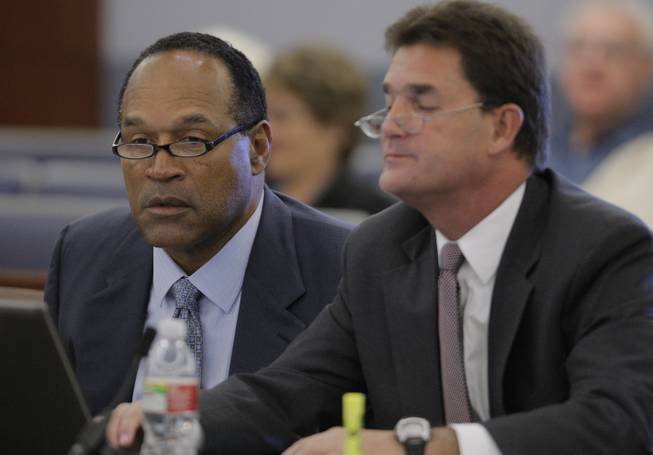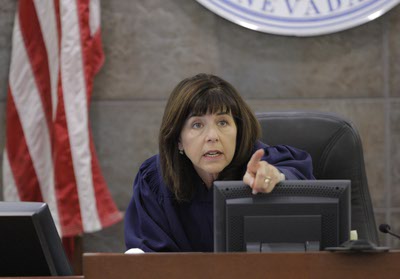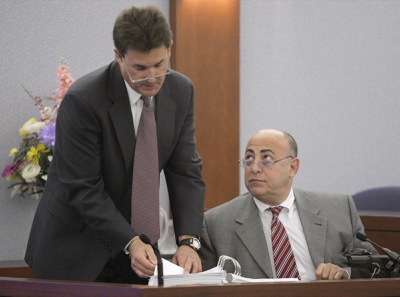
AP Photo/Jae C. Hong/pool
O.J. Simpson, left, appears in court with his attorney Yale Galanter as his trial continues Tuesday, Sept. 23, 2008, in Las Vegas. Simpson faces 12 charges, including felony kidnapping, armed robbery and conspiracy.
Published Tuesday, Sept. 23, 2008 | 4:36 p.m.
Updated Tuesday, Sept. 23, 2008 | 7:45 p.m.
Sun coverage
Twitter updates
O.J. Simpson’s lawyer, Yale Galanter, has moved for a mistrial.
The motion came just after 4 p.m. Tuesday, following David Cook being admitted by District Judge Jackie Glass as the 12th witness in Simpson's high-profile robbery/kidnapping trial in Las Vegas.
Robert Lucherini, the attorney for Simpson's co-defendant, Clarence "C.J." Stewart, also moved for a mistrial — and filed a motion to sever Stewart from Simpson's trial, as well.
The lawyers asked for the mistrial because Cook is the lawyer who represents the family of murder victim Ronald Goldman. Goldman and Simpson’s ex-wife, Nicole Brown Simpson, were murdered in 1994.
Simpson was charged with both murders but was acquitted in 1995 following a highly publicized criminal trial.
The Goldman family then filed a civil action against the former NFL star, which found him liable for the deaths. That court issued a $33.5 million judgment against Simpson and split the sum between the Goldmans and Nicole Brown Simpson’s estate, the two children she has with O.J. Simpson, and Sydney and Justin Simpson.
Simpson and Stewart, his former golfing buddy, currently face 12 robbery, kidnapping and weapons charges stemming from a raid of a Place Station hotel room last year.
“This testimony has no relevance to this case,” Galanter told the court after Cook took the stand. “It’s prejudicial.”
Galanter said “the reason they’re calling Mr. Cook is to remind the jurors” about Simpson’s previous legal troubles.
Prosecutors defended their witness.
“The fact of the matter is, is that Mr. Simpson talks about the (civil) judgment, the Goldmans on the audio tape. This was one of the motives for the robbery,” District Attorney David Roger said.
Thomas Riccio, the middleman who arranged the meeting between Simpson and the two memorabilia dealers who claim they were robbed, secretly recorded several conversations with Simpson and the victims. Those nine audio files are now key evidence in the trial.
Simpson refers to the Goldmans as "the gold-diggers" during one of the recordings.
The State believes Simpson wanted to recover items from the victims, memorabilia dealers Bruce Fromong and Alfred Beardsley, in Nevada instead of California because of his ongoing efforts to skirt turnover orders filed by the Goldmans.
"(Simpson) said that it wasn't going to work in California because his lawyers said there could be a lot of problems because of the Goldmans ... would get the stuff," Riccio testified Monday.
Simpson lived in California at the time of the alleged robbery, but has since moved to Miami, Fla.
Simpson says the items he and his entourage allegedly stole on Sept. 13, 2007 - including several NFL game presentation footballs, his 1969 NFL All-Star plaque, and numerous personal and family photos - were stolen from him.
Prosecutors and state witnesses, meanwhile, have said Simpson's former agent, Mike Gilbert, helped move the items from Simpson's Brentwood, Calif., home and then stored them with associates of Simpson's and in storage lockers to hide the assets from collection officers.
Officials were later sent to seize valuables from Simpson's home that could be resold and applied against the outstanding debt to the Goldmans.
Lucherini, along with Stewart's other lawyers, E. Brent Bryson and Charles D. Jones, have made several attempts to have their client's trial severed from Simpson's. They allege Simpson's notoriety and previous legal troubles prohibit Stewart's right to a fair trial.
The Nevada Supreme Court rejected a motion to sever before Simpson and Stewart's joint trial began. Judge Jackie Glass, who is presiding over the criminal trial proceedings, has rejected several additional motions to sever.
After considering precedent, case law and her own former judgments for more than two hours, the judge dismissed the jury just after 5 p.m.
She had Cook take the stand in the absence of the jury so she could ask him some questions before lawyers asked some questions of their own.
Holding an evidentiary hearing in the absence of the jury prevented risking his account from tainting the jury or providing the defense a solid foundation from which to launch a motion for a mistrial.
Glass will decide whether or not Cook will take the stand on Wednesday morning.
Before dismissing for the day, Glass asked Cook to provide a very limited testimony if he is called to the stand tomorrow.
She said she "wants to avoid any non-responsive answers, any spontaneous declarations, anything, any personal opinions that might in some way prejudice my jury and cause there to be a mistrial."
"Any personal opinions or feelings you may have and you would like to express, I don't want them expressed them here. This is not an appropriate forum for any such remarks along those lines," Glass said.
Earlier during the day, Galanter allowed jurors to realize that they might be putting Simpson, 61, behind bars for the rest of his life if they found him guilty, as Galanter cross-examined Simpson's former friend, Charles Ehrlich. Ehrlich was called to the stand Monday but had to return today to complete his testimony.
Ehrlich was the last of Simpson's accomplices to strike a deal with the prosecution. The 54-year-old was originally charged with the same 12 counts that Simpson and Stewart, 54, now face. But Ehrlich has since agreed to plead guilty to two lesser charges: being an accessory to attempted robbery and attempted burglary.
The judge summarized Ehrlich's plea agreement: "He was facing a potential life sentence with a possibility of parole after a minimum of five years, he was facing 12 charges, now he's facing two, and the two he's facing are probation eligible."
Probation eligible means Glass has the power to sentence him to a sentence of parole conditions rather than jail time. She will deliver Ehrlich's sentence at the end of the trial.
During a particularly strategic cross-examination of the witness, Galanter inadvertently mentioned details of the hefty sentence the defendants face.
As Galanter questioned Ehrlich about his plea bargain Tuesday morning, Simpson's other attorney, Garbriel Grasso, displayed a PowerPoint presentation that outlined Ehrlich's previous charges and sentences.
Prosecutors objected just seconds after the slide was displayed and Judge Jackie Glass promptly told Grasso to remove the slide.
The problem related to sharing details of defendants' potential sentences with the jury because that information might impact the jury's decision.
Because Ehrlich initially faced the same charges as the defendants, outlining his original possible sentence effectively identified details of Simpson and Stewart's potential fate, as well — spending the rest of their lives in prison.
They face a dozen charges, including two counts of first-degree kidnapping with use of a deadly weapon, which carries a possible life sentence, two counts of robbery with use of a deadly weapon, and two counts of assault with a deadly weapon.
Glass took an extended break to review precedent related to sharing details of potential sentences with the jury. The judge referred to a 9th District case from 2007 when she returned with her decision.
When Glass returned, she asked Grasso to remove details of possible sentences from his presentation, but said she would allow Galanter to discuss the details in front of the jury.
"This will apply to all of the other witnesses who are testifying in this case," Glass said.
Before proceedings resumed Glass instructed the jury "not to consider the issue of the punishment in determining the guilt or innocence of the defendants as that is a matter that lies solely with the court."
"You are only to consider the topic of punishment as it relates to the testimony of the witness that is currently on the stand," Glass said.
After reading the admonishment, Galanter resumed his cross-examination.
"Entering into this plea agreement was a substantial benefit for you," he observed. "That 12-count indictment was reduced to two charges ... and your original sentence, life with the possibility of parole after five years, (has been) reduced to probation eligible, with a maximum of five years."
Ehrlich concurred with Galanter's assessment.
Galanter was critical of Ehrlich's oftentimes foggy memory and at one point, the defense accused the witness of having a "selective memory."
Ehrlich had trouble remembering dates and the sequence of events, including when he met with the district attorney, law enforcement and signed documents relating to his plea agreement.
He at one point admitted, "I guess I was incorrect with that previous testimony," after being shown documents that demonstrated a different order of facts than what he had just told the court.
Ehrlich, who is one of two white men that were in Simpson's entourage during the incident, has referred to other accomplices as "black guys" from time to time when he wasn't sure of the individuals' names.
Stewart's layer, E. Brent Bryson, was visibly frustrated when Ehrlich told him that despite his imperfect memory, he recalled Stewart was at the Palms on the afternoon of Sept. 13 as Simpson and the others planned the raid.
Ehrlich said he couldn't remember what role Stewart played in during the poolside meeting that afternoon.
"He was there for a while, I remember that," Ehrlich told the court. "I remember talking to him."
Still, Ehrlich couldn't say what he said to him, what they talked about, or what Stewart said to the other men.
Ehrlich said he remembered Stewart was "shouting" during the confrontation inside the Palace Station hotel room that night but said he "cannot recall" what Stewart was yelling about.



Join the Discussion:
Check this out for a full explanation of our conversion to the LiveFyre commenting system and instructions on how to sign up for an account.
Full comments policy